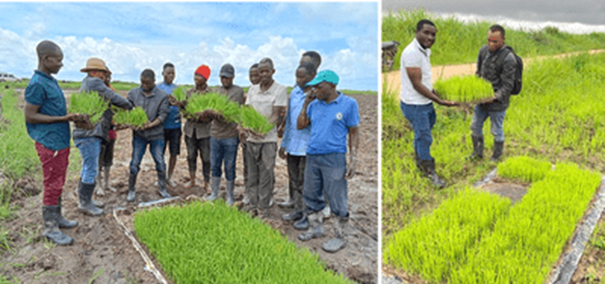Labour Service Providers' Training (January 2024)

TARI Ifakara in collaboration with Rikolto conducted Labour Service Providers’ Training on SRP (Sustainable Rice Platform standard) Framework and Practical Demonstrations at Madibira scheme, Mbarali district, from 02 – 11th January 2024.
Training led by Dr. Kulwa Furahisha (PhD)
Purpose of the training: To equip Labour Service Providers with knowledge and skills needed in transition to sustainable rice production
Training Descriptions
a) Theory sessions
The theory training was conducted, covering all 8 themes of the SRP standard requirements, with focus on seed quality aspects, nursery, and crop establishment (seed quantity, age of seedling, transplanting in line/square etc.), as well as crop/field management (precision fertilizer and judicious pesticides application) as per SRP standard training need assessment conducted previously. About 60 labour service providers, mostly trans-planters, fertilizer applicators and pesticides applicators, attended the training. Four village agricultural and extension officers (VAEOs) engaged in the training for due purpose – as local training organizer and participants as well.
i) Hands on training on modified rice mat nursery demonstration
Participants had an opportunity for hands on demonstration on rice mat nursery preparation – from nursery bed preparation to watering of the seeded nursery. A modified rice mat nursery uses materials and resources available within the locality, while offering farmer opportunity to plant young and healthy seedlings of 8-14 days after germination, seedlings recover very fast as they are not uprooted, portable and easy to transport from nursery to main field and can be done near farmers’ home.
ii)Practical Demonstrations – transplanting in line/square
A practical demonstration on transplanting in line/square with one seedling per hill was conducted using young seedling (14 days old after germination), from one of the mat nurseries. This method reduces seed rate i.e., quantity of seed per area while boosting productivity, as well as allow application of weeder and fertilizer applicator equipment.
iii)Practical Demonstrations – Alternate Wetting and Drying (AWD) and Leaf Color Chart (LCC)
Demonstration was performed on how to determine when to irrigate the paddy field using a perforated water pipes through Alternate Wetting and Drying (AWD) method. AWD is a water saving technology that farmers can apply to reduce water use in irrigated fields as well as methane emissions depending on the combination of water usage and management of the rice stubble..